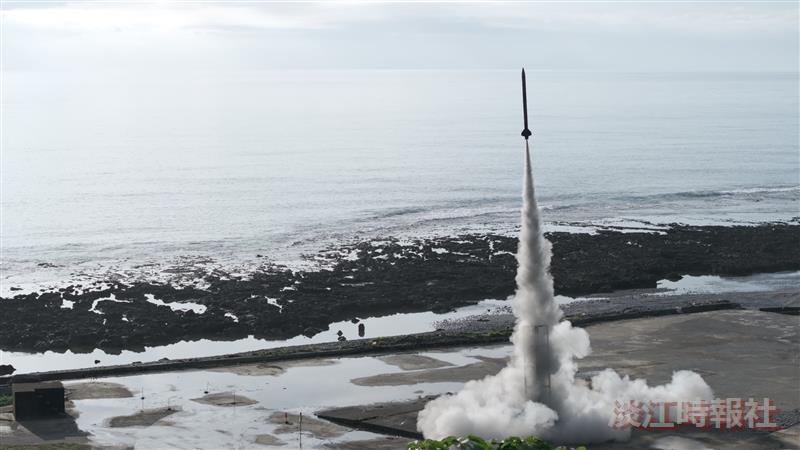News and Events
Establishment of Space Technology Research Center Reveals Tamkang’s Determination for Development
Date 2024-02-19 1638 Clicks

Establishment of Space Technology Research Center Reveals Tamkang’s Determination for DevelopmentTamkang University's 2 successful launches validate our capabilities in executing small-scale scientific rocket projects. The image shows the impressive launch of our second successful rocket, Jessie. (Image provided by TASA)
Tamkang University has passed the establishment regulations for the "Center for Astronautics and Space Exploration (CASE)" and plans to establish it in the second semester of the 2023 academic year. In addition to enhancing research capabilities in space technology-related fields, the center will also focus on practical information integration and utilization. This initiative also serves as an external declaration of our university's determination to accelerate space technology development.
Dr. Fu-Yuen Hsiao, chair of the Department of Aerospace Engineering, stated, "Looking ahead, the vision of Tamkang's Aerospace Engineering Department extends beyond small-scale sounding rockets." In the future, the research center will support in-house space technology research and development, recruit and integrate more interdisciplinary experts, and actively undertake commissioned projects from external organizations. He mentioned that since 2022, Tamkang University has been participating in the CubeSat team of National Cheng Kung University. He is responsible for developing new orbital control technology in the "Lilium2&3 CubeSat" constellation project scheduled for launch in 2025. The first CubeSat, Lilium-1, was successfully launched on December 2, 2023, at 2:19 AM using a rocket from SpaceX from the Vandenberg Base in California, into a low Earth orbit of 520 kilometers and has been operational since then. The following 2 satellites, Lilium2 & 3, are scheduled for launch in 2025, where the new orbital control method developed by the Aerospace Engineering Department will be verified on these 2 satellites. After the establishment of CASE, it will provide more energy in subsequent technological developments.
TASA is expected to host the International Astronautical Federation (IAF) International Workshop on Satellite Constellations and Formation Flying (IWSCFF) in December this year. Dr. Hsiao serves as a member of the organizing committee, and CASE will also participate as a co-organizer.
SDGs #SDG04 Quality Education #SDG09 Industry, Innovation and Infrastructure #SDG17 Partnerships for the Goals
LINKS
- PREV:Colleges of Science, Engineering, and Artificial Innovative Intelligence Join Forces, the Quantum Computing Center Undertakes a Million-dollar Project 2024-02-19
- NEXT:Golden Eagle Alumni Lunar New Year Gathering – Cheng-Rong Chiang to Sponsor Tamkang’s USR x CSR Common Good Program 2024-02-26
- Chu Duc Trinh’s Bio-MEMS Research Sparks Lively Discussion Among Engineering Faculty and Students 2025-11-11
- Sonia Nieto Urges Educators to Center Love in Pursuit of Educational Equity 2025-11-11
- 75th Anniversary Concert: Alumni Stars and Youthful Music Ignite the Crowd 2025-11-10
- Freshman Cup Tips Off with High Energy: Civil Engineering and International Business Take Basketball Titles; Computer Science and Business Administration Dominate Volleyball 2025-11-10
- Physics Department’s Panda Lecture Invites Nobel Laureate Gerardus ’t Hooft to Discuss Science Education and International Collaboration 2025-11-10
- Celebrating TKU’s 75th Anniversary, President Keh Announces 3-Year Plan to Achieve “All-Cloud Smart Campus 3.0” 2025-11-08
- TKU 75th Anniversary Calligraphy & Painting Exhibition Showcases a New AI-Driven Artistic Vision 2025-11-07
- Celebrating 75 Years Together with TKU: English Department Faculty and Students Reunite in Remembrance 2025-11-02
- Math Department Master Lecture: Prof. Philippe Souplet Explores the Resonance Between Mathematics and Music Through Jazz Piano 2025-11-01
- 33 Alumni Donate Over NT$20 Million to Revitalize the University Commons 2025-10-30